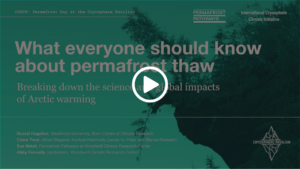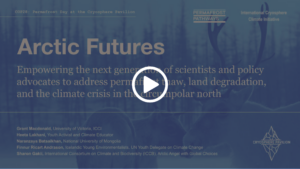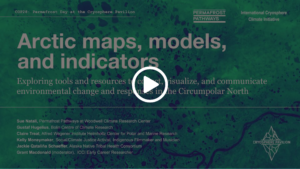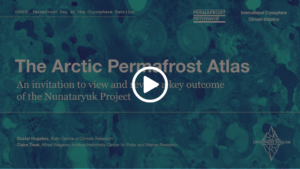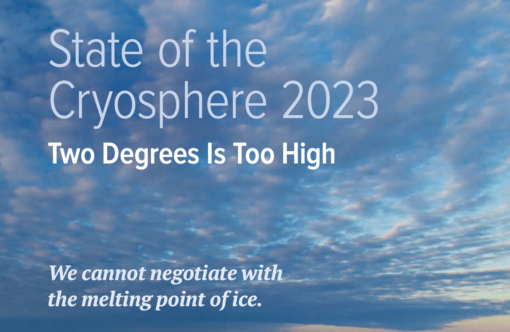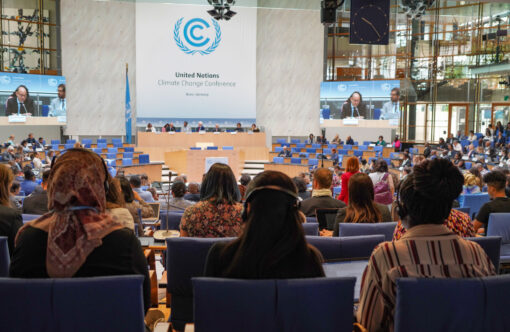Elevating permafrost thaw and centering Arctic Indigenous voices
From Nov. 30 – Dec. 12, 2023, Permafrost Pathways will be attending the 28th Conference of the Parties of the UNFCCC (COP28) taking place in Dubai, United Arab Emirates. Through participation in Permafrost Day at the Cryosphere Pavilion and other key Arctic programming at the Woodwell Climate Pavilion, our delegation aims to increase the visibility and awareness of permafrost thaw within the global carbon budget discourse and center the voices of Arctic Indigenous communities and partners on the frontlines of climate change.
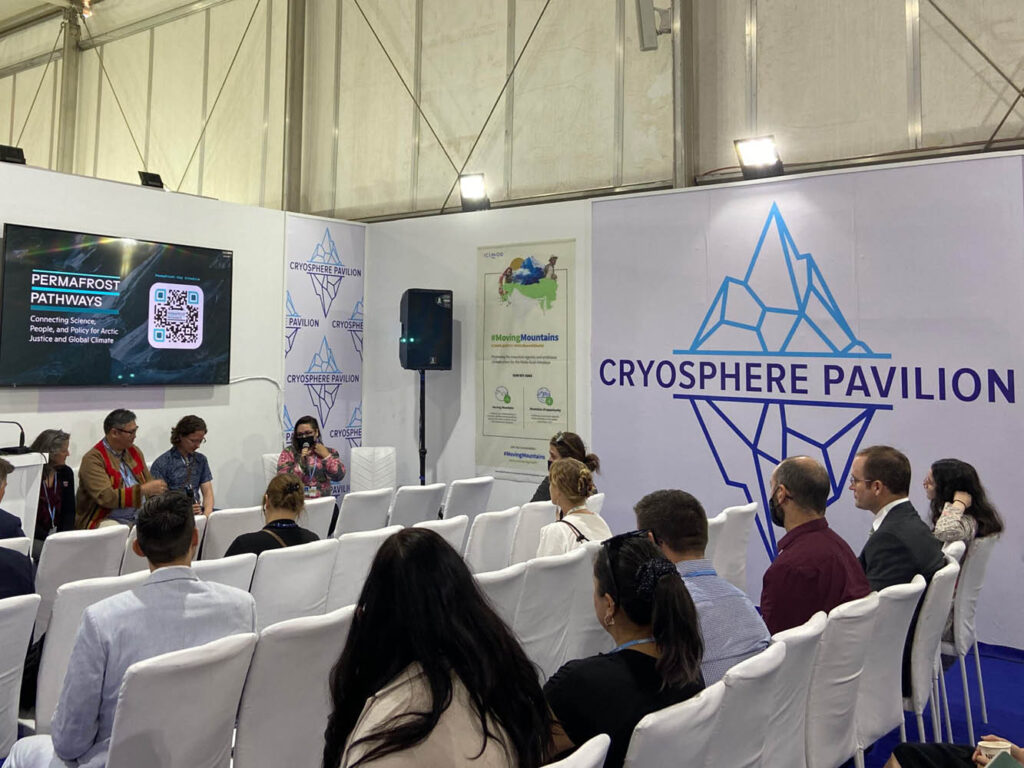
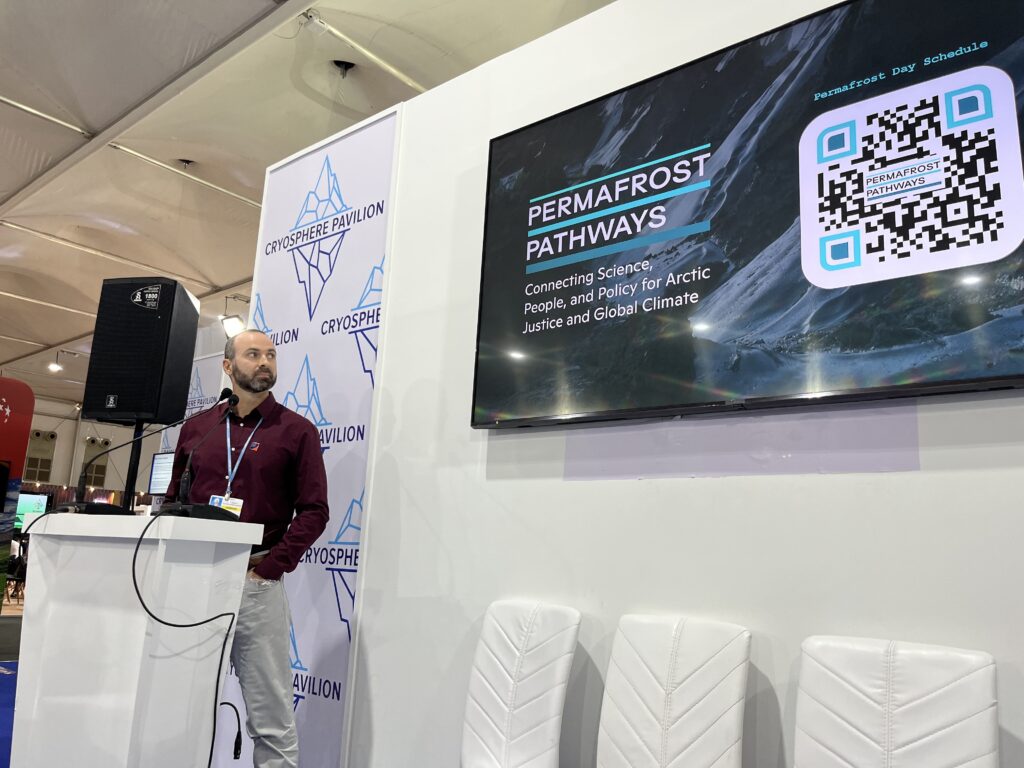
Permafrost Day in the Cryosphere Pavilion
Permafrost Pathways is a proud co-organizer of Permafrost Day at COP28 held on Monday, Dec. 4 in the Cryosphere Pavilion and hosted by our colleagues at the International Cryosphere Climate Initiative (ICCI). This is a whole-day program where we’ll be covering the local to global implications of thawing ground across the Arctic permafrost region.
Sessions will be recorded and can be livestreamed on the Cryosphere Pavilion Facebook, YouTube, and Twitch as well as the ICCI YouTube page.
10:00 – 10:50 AM
What everyone should know about permafrost thaw: breaking down the science and global impacts of Arctic warming
Hear directly from Arctic scientists about why permafrost matters and its relevance to climate negotiations. You’ll learn about what permafrost is and where is it found; carbon emissions from permafrost thaw; tipping points; the state of monitoring, measuring, and accounting for these emissions; land degradation and displacement of Arctic communities; loss and damage in the circumarctic and the impacts on Indigenous and non-Indigenous communities; and the need for co-produced resilience strategies.
SPEAKERS
- Gustaf Hugelius, Stockholm University, Bolin Centre of Climate Research
- Claire Treat, Alfred Wegener Institute Helmholtz Center for Polar and Marine Research
- Sue Natali, Permafrost Pathways at Woodwell Climate Research Center
- Abby Fennelly (moderator), Woodwell Climate Research Center
11:00 AM – 12:15 PM
Arctic futures: empowering the next generation of scientists and policy advocates to address permafrost thaw, land degradation, and the climate crisis in the circumpolar north
This session will be a dynamic panel discussion featuring early-career scientists and youth advocates leading the charge for collaborative climate solutions in the Circumpolar North. Focused on Arctic research, permafrost thaw, land degradation, and broader climate impacts, these voices underscore the interconnectedness of the Arctic’s challenges and their far-reaching consequences.
While the session emphasizes the critical role of current decision-makers in addressing the warming Arctic, it equally highlights the intergenerational nature of the climate crisis. Acknowledging that projected environmental changes extend beyond our lifetimes, this discussion champions the need for urgent action from existing leaders and a space for the next generation to direct decisions and call for support.
SPEAKERS
- Grant Macdonald, University of Victoria, ICCI
- Heeta Lakhani, Youth Activist and Climate Educator
- Naranzaya Batsaikhan, National University of Mongolia
- Finnur Ricart Andrason, Icelandic Young Environmentalists, UN Youth Delegate on Climate Change
- Sharon Gakii, International Consortium on Climate and Biodiversity (ICCB), Arctic Angel with Global Choices
1:00 – 2:00 PM
Arctic maps, models, and indicators: exploring tools and resources to collect, visualize, and communicate environmental change and responses in the Circumpolar North
Join us for a captivating session exploring the tools and resources shaping our understanding of permafrost thaw and its pivotal role in climate change. Presenters will showcase advancements in data collection, analysis, and communication, shedding light on the challenges faced in these processes.
Discover how experts tackle complexities such as intricate models and the resource-intensive nature of improvement efforts. Delve into concerns surrounding data sharing and open-source information and explore ongoing initiatives addressing these challenges, including participatory mapping, data sovereignty principles, and innovative practices.
SPEAKERS
- Sue Natali, Permafrost Pathways at Woodwell Climate Research Center
- Gustaf Hugelius, Bolin Centre of Climate Research
- Claire Treat, Alfred Wegener Institute Helmholtz Center for Polar and Marine Research
- Kelly Moneymaker, Social/Climate Justice Activist, Indigenous Filmmaker and Musician
- Jackie Qataliña Schaeffer, Alaska Native Tribal Health Consortium
- Grant Macdonald (moderator), ICCI Early Career Researcher
2:05 – 2:50 PM
Meet the permafrost scientists
Please contact Kate Petersen, Arctic Communications Strategist for Permafrost Pathways at Woodwell Climate Research Center, for additional information.
Participants:
- Sue Natali, Permafrost Pathways Project Lead, Woodwell Climate Research Center
- Gustaf Hugelius, Department of Physical Geography at Stockholm University, Vice Director of the Bolin Centre of Climate Research
- Claire Treat, Research Group Lead at Alfred Wegener Institute Helmholtz Center for Polar and Marine Research
4:00 – 5:00 PM
The “Arctic Permafrost Atlas”: an invitation to view and review a key outcome of the Nunataryuk Project
Edited by GRID-Arendal together with all Nunataryuk Project partners, the Arctic Permafrost Atlas, published in October 2023, presents state-of-the-art knowledge about permafrost and the impacts of permafrost thaw on human communities in the Arctic. The Atlas is intended to translate and consolidate the available knowledge on permafrost via maps, words, art, and stories. This session will present the final culmination of work from nearly a hundred individuals and explain why it is so important to capture the voices of scientists, Indigenous Peoples, northern residents, and local practitioners who together provide a holistic and inclusive view of today’s challenges in the “country of permafrost”.
SPEAKERS
- Gustaf Hugelius, Bolin Centre of Climate Research
- Claire Treat, Alfred Wegener Institute Helmholtz Center for Polar and Marine Research
Arctic programming in the Woodwell Climate Pavilion
Join Permafrost Pathways on Tuesday, Dec. 5 and Wednesday, Dec. 6 in the Woodwell Climate Pavilion for additional Arctic programming.
*Session schedule subject to change.
12:00-1:00 PM
Arctic research, Indigenous rights, and co-production of knowledge: fostering collaboration across disciplines to share the story of a changing Arctic landscape
A cooperative approach to understanding and communicating Arctic Change, including permafrost thaw process and impacts, has proven more likely to produce meaningful research and positive policy interventions in the Arctic. This session will focus on
- Principles of knowledge co-production in the permafrost region–an alternative approach to data collection, environmental monitoring, and climate resilience that utilizes Western science, Indigenous knowledge, and local observations and which is led by affected communities and
- Innovative approaches to communicating these findings via storytelling and co-produced mediums.
The discussion will provide anecdotes from across the Circumpolar North: for example, western-trained scientists are collaborating with Alaska Native communities to help inform decisions around managed retreat and community-driven relocation, and documentary filmmaking is bringing to life the climate impacts and experiences of Indigenous Arctic communities responding to these changes. The session will invite discussion of how policymakers, scientists, and artists can help to co-create equitable, Indigenous-led observation platforms, robust environmental-health interventions, and climate adaptation plans in response to permafrost thaw and other rapid Arctic changes.
SPEAKERS
- Sue Natali, Permafrost Pathways at Woodwell Climate Research Center
- Kelly Moneymaker, Social/Climate Justice Activist, Indigenous Filmmaker and Musician
- Chief Gary Harrison, Traditional Chief of Nay’dini’aa Na’ Kayax’ (Chickaloon Village), Alaska, and Tribal Chairman of Chickaloon Village Traditional Council, Co-founder of the Arctic Athabaskan Council
- Chief Bill Erasmus, Canadian Chair of the Arctic Athabaskan Council, Honorary National Chief of the Dene Nation for Life
- Claire Treat (moderator), Alfred Wegener Institute Helmholtz Center for Polar and Marine Research
CO-HOSTED BY GOOGLE.ORG AND PERMAFROST DISCOVERY GATEWAY
B7 Bldg 87 – Woodwell Climate Meeting and Presentation Space
Reception to follow
The Arctic is warming at least three times faster than the global average, posing existential risks at both local and global scales. For millions of Arctic residents, dramatic landscape changes due to permafrost thaw and other climate hazards pose a major security risk—threatening both physical infrastructure and also traditional ways of life for Arctic communities. For the rest of the globe, thawing permafrost represents a significant source of greenhouse emissions, the impacts of which further undermine the safety and stability of global ecosystems. Despite recognition of these risks, the size and heterogeneity of the Arctic makes monitoring, predicting, and responding to rapid change extremely challenging. Fortunately, new advances in science and technology, including cutting-edge AI computing, are enabling governments to close information gaps, improve projections of future Arctic changes, and develop responsive policy. This panel highlights ongoing efforts from Western-trained scientists, the private sector, and the US government to inform governance for a safer and more resilient Arctic.
Following the panel discussion, there will be a brief performance by Kelly Moneymaker and a reception with refreshments.
SPEAKERS
- Dr. R. Max Holmes, President & CEO – Woodwell Climate Research Center
- Dr. Susan Natali, Permafrost Pathways – Woodwell Climate Research Center
- Brigitte Hoyer Gosselink, Head of Product Impact at Google.org
- Iris A. Ferguson, Deputy Assistant Secretary of Defense for Arctic and Global Resilience, US Department of Defense
- Kelly Moneymaker, Social/Climate Justice Activist, Indigenous Filmmaker and Musician
- Dr. Heather Goldstone (moderator), Woodwell Climate Research Center
1:00 – 2:00 PM
Arctic climate, energy, and geopolitics: pathways for global solutions from the Circumpolar North
Against the backdrop of a rapidly warming Arctic, this discussion will bring together Arctic-focused policy experts/scholars, Arctic scientists, and government representatives from Arctic states to discuss ongoing efforts to promote equitable, forward-looking adaptation and mitigation solutions in the North. Speakers will provide details on the most drastic climate impacts on the Arctic region, including permafrost thaw, which presents both local risks to Arctic communities and global import for carbon budgets and climate change response. The panel will consider how this reality is nevertheless inspiring solutions–catalyzing energy-sector, geopolitical, technical, scientific, and policy advances informed by multi-disciplinary collaboration and co-production of knowledge.
SPEAKERS
- Olafur Ragnar Grimsson, Former President of Iceland
- Sue Natali, Permafrost Pathways at Woodwell Climate Research Center
- Meghan O’Sullivan, Belfer Center, Harvard Kennedy School
- Halla Hrund Logadóttir, National Energy Authority of Iceland
- Kate Guy, US State Department
- Heather Goldstone (Moderator), Woodwell Climate Research Center
Connect with us at COP
Onsite
Susan M. Natali
snatali@woodwellclimate.org
Senior Scientist, Woodwell Climate Research Center
Project Lead, Permafrost Pathways
LinkedIn
Virtual – Media Inquiries
Kate Petersen
kpetersen@woodwellclimate.org
Arctic Communications Strategist
Permafrost Pathways
Woodwell Climate Research Center
Resources
- Establishing an Arctic carbon monitoring network to better address the climate crisis
- Permafrost Pathways policy factsheet
- Loss and damage in the circumpolar North
- The State of the Cryosphere Report 2023
- A stocktake of the global permafrost region
- Incorporating permafrost into climate mitigation and adaptation policy
- What is permafrost?
- The critical missing expense in global climate budgets
- What can be done about permafrost thaw?
- Thawing Permafrost: Science, Policy, and Environmental Justice in the Arctic
- We must stop fossil fuel emissions to protect permafrost ecosystems


